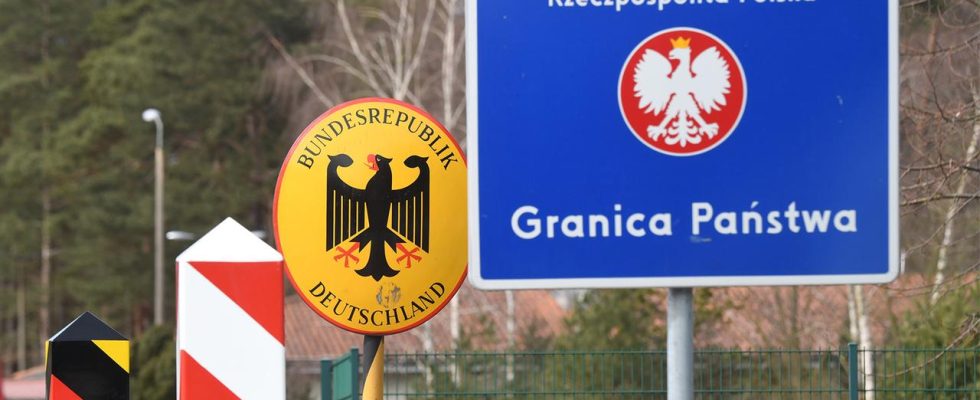Ahead of the election in Poland, people on both sides of the border are looking intently towards Warsaw. They are concerned about German-Polish relations and the question of how the election could affect their everyday lives.
Fred Mahro (CDU) has been mayor of the city of Guben an der Neisse for five years. In fact, he is mayor of half the city, because on the Polish side of the river the town is called Gubin. Before the Second World War, both parts belonged together. And even today, Guben and Gubin feel very close and work closely together. People feel at home on both sides of the Neisse. Work in the other country, go to daycare, school or learn a job. For Fred Mahro it is clear: Guben is a city in two countries.
His non-party counterpart Bartlomiej Bartczak from Gubin can only agree with this. The relationship between Germans and Poles is very good here and that will not be ruined by the anti-German propaganda of the ruling PiS party. “We here in Guben and Gubin do our thing independently of major politics. Regardless of what which politician has just said, who has insulted whom at the moment,” he emphasizes emphatically.
Guben and Gubin want to continue their good cooperation and their joint projects. This is how a special police unit was created four years ago: Brandenburg and Polish police officers do patrol duty together. In addition to the normal everyday police work, they also try, for example, to find pollutants on the Polish side that are being transported illegally to Germany, or to check abandoned cars on the German side.
Together in the future
The two cities built a common sewage treatment plant 25 years ago. From an economic perspective, this makes sense, says Carsten Jacob, head of the information center for the Spree-Neiße-Bober Euroregion in Guben. “Anyone who only thinks nationally in a border region has a sphere of influence of only 180 degrees.” His association is currently supporting ten projects on both sides of the border.
Among other things, scientists from the BTU Cottbus and the University of Zielona Góra are researching joint energy efficiency and storage. Despite political tensions, the relationship of trust on both sides of the Neisse is “very high,” said Jacob. Little will change after the election. It is important to him that the “supposed peripheral regions” continue to be strengthened and brought together.
The election campaign theme is economy
Nevertheless, Bartlomiej Bartczak would like to see a government other than the PiS. He supports his brother, who is running as an independent candidate in order to make the voice of the communities in the border region heard. Overall, the opposition in western Poland is significantly stronger than in the rest of the country. The area is economically successful and the PiS has its core voters in low-income areas, more in eastern Poland and in the countryside. On the German-Polish border, however, criticism of the PiS’s social policy predominates. Although it helps poorer people a lot, many entrepreneurs believe that it is financed at the expense of the economy. Many people here say that the extremely high inflation in Poland is a consequence of this.
This topic is hotly debated at the so-called “Poland Market” in Hohenwutzen an der Oder, about 120 km north of Guben. Here, traders sell Polish goods that have previously been very cheap for German customers. Due to inflation, this price advantage has almost disappeared, so that Polish traders fear being left with their goods. That’s why many don’t want to vote for the PiS on Sunday, like Ilona, who runs a café here: “We’re all worried about high inflation. It’s time for a change of government. But I’m afraid that the current government will be in power remains.”
Many German customers, on the other hand, are currently still benefiting from the PiS government. It is an open secret that the state-owned oil company Orlen is now selling its fuel at extremely cheap prices ahead of the elections. As a kind of election advertising. A liter of fuel costs around 1.30 euros, and the queues at the petrol stations in the border area are correspondingly long. The Poles, in turn, fear that they will pay for this subsidy after the election.
Who owns the Oder?
The Oder also separates the two countries more in other respects than the Neisse in the south. The fish deaths in summer 2022 are still having an impact, which is why the countries are arguing about the future of the border river. The German side wants more renaturation and environmental protection, the Polish side wants more economic use as a waterway. Although environmental protection associations and interested residents in Poland are also campaigning against excessive commercialization, the PiS government is sitting on the matter. Even Polish court rulings against the expansion of the Oder are ignored.
The Oder also became an election campaign topic in Poland. The social democratic left LEWICA, for example, is promoting its “Clean Rivers” program in the election campaign. Jakub Korczynski is LEWICA’s Sejm candidate. He emphasizes that a change of government would enable a different environmental policy: “We are unanimously in opposition. We think that the Oder ecosystem is essential for Germany and also in Poland. For biodiversity, for fishermen and everything… We have concrete measures that we want to implement.”
Growing together the border region
And the districts on the German banks of the Oder are also hoping for a change of government. They assume that better cooperation with the Polish authorities would then be possible.
A collaboration that has existed in Guben/Gubin for a long time. The good relationship at the local level is very important to everyone here – in both countries. So important that at least Guben’s mayor, Fred Mahro, looks calmly on Sunday: “No matter who is in power, there will be no disruption to the growing together of the border region as long as the EU sticks together.”

